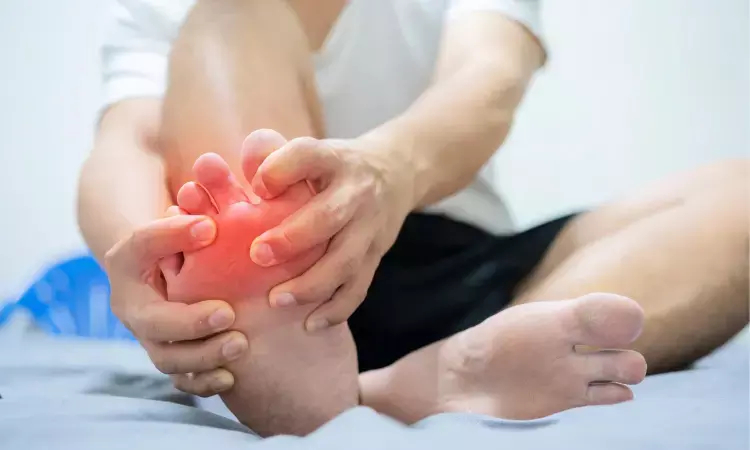- Home
- Medical news & Guidelines
- Anesthesiology
- Cardiology and CTVS
- Critical Care
- Dentistry
- Dermatology
- Diabetes and Endocrinology
- ENT
- Gastroenterology
- Medicine
- Nephrology
- Neurology
- Obstretics-Gynaecology
- Oncology
- Ophthalmology
- Orthopaedics
- Pediatrics-Neonatology
- Psychiatry
- Pulmonology
- Radiology
- Surgery
- Urology
- Laboratory Medicine
- Diet
- Nursing
- Paramedical
- Physiotherapy
- Health news
- Fact Check
- Bone Health Fact Check
- Brain Health Fact Check
- Cancer Related Fact Check
- Child Care Fact Check
- Dental and oral health fact check
- Diabetes and metabolic health fact check
- Diet and Nutrition Fact Check
- Eye and ENT Care Fact Check
- Fitness fact check
- Gut health fact check
- Heart health fact check
- Kidney health fact check
- Medical education fact check
- Men's health fact check
- Respiratory fact check
- Skin and hair care fact check
- Vaccine and Immunization fact check
- Women's health fact check
- AYUSH
- State News
- Andaman and Nicobar Islands
- Andhra Pradesh
- Arunachal Pradesh
- Assam
- Bihar
- Chandigarh
- Chattisgarh
- Dadra and Nagar Haveli
- Daman and Diu
- Delhi
- Goa
- Gujarat
- Haryana
- Himachal Pradesh
- Jammu & Kashmir
- Jharkhand
- Karnataka
- Kerala
- Ladakh
- Lakshadweep
- Madhya Pradesh
- Maharashtra
- Manipur
- Meghalaya
- Mizoram
- Nagaland
- Odisha
- Puducherry
- Punjab
- Rajasthan
- Sikkim
- Tamil Nadu
- Telangana
- Tripura
- Uttar Pradesh
- Uttrakhand
- West Bengal
- Medical Education
- Industry
Gout Patients Face Higher Risk of Chronic Opioid Use, VA Study Finds

Researchers have found in a Veterans Health Administration study that individuals with gout are significantly more likely to be prescribed chronic opioids compared to those without gout, with an adjusted hazard ratio of 1.30. Thus Gout Patients Face Higher Risk of Chronic Opioid Use. This study was published in the Arthritis Care & Research journal by Lindsay N. and colleagues.
Despite the fact that opioids are often prescribed for the treatment of acute flares of gout, the long-term consequences of opioid exposure for patients with gout have not been well established. Long-term opioid use is linked to serious adverse health consequences, including dependence and overdose. In order to bridge this gap, investigators conducted a large matched cohort study within the VA system to assess whether gout patients are at higher risk for chronic opioid prescription relative to non-gout patients.
This was a matched cohort investigation based on national VA data. Patients who had gout were identified by validated diagnostic codes and matched to up to 10 non-gout controls according to age, sex, and year of VA entry. The main outcome was receipt of chronic opioids, measured using a validated administrative algorithm.
Statistical analysis was carried out with the help of multivariable Cox regression, after controlling for demographic variables, comorbidities, and treatment variables. Further, subgroup analyses were performed in the population of gout patients to determine independent predictors of chronic opioid exposure.
Results
• The cohort was followed up for a mean of 4.52 years. Among them, 6.9% of patients with gout and 3.8% of non-gout controls received chronic opioids.
• Following covariate adjustment, receipt of chronic opioids remained associated with gout, with an adjusted hazard ratio (aHR) of 1.30 (95% CI: 1.28–1.32).
• 6.9% of gout patients compared to 3.8% of controls were exposed to chronic opioids.
• 30% increased adjusted risk of exposure to chronic opioids in gout (aHR 1.30).
• Median follow-up: 4.52 years.
• Increased risk groups: women, younger patients, non-Hispanic Black patients, rural residents, smokers, underweight/obese patients, and those with increased comorbidity.
• Rheumatology referral and urate-lowering treatment were associated with increased odds of chronic opioid fills.
This research proved that patients with gout are at significantly greater risk for chronic opioid exposure than those without gout. The risk was heightened in particular populations, such as women, racial minorities, rural dwellers, and individuals with higher comorbidities. These findings underscore the imperative to optimize gout treatment approaches and to examine whether optimizing disease care can decrease opioid dependence.
Reference:
Dr Riya Dave has completed dentistry from Gujarat University in 2022. She is a dentist and accomplished medical and scientific writer known for her commitment to bridging the gap between clinical expertise and accessible healthcare information. She has been actively involved in writing blogs related to health and wellness.
Dr Kamal Kant Kohli-MBBS, DTCD- a chest specialist with more than 30 years of practice and a flair for writing clinical articles, Dr Kamal Kant Kohli joined Medical Dialogues as a Chief Editor of Medical News. Besides writing articles, as an editor, he proofreads and verifies all the medical content published on Medical Dialogues including those coming from journals, studies,medical conferences,guidelines etc. Email: drkohli@medicaldialogues.in. Contact no. 011-43720751


